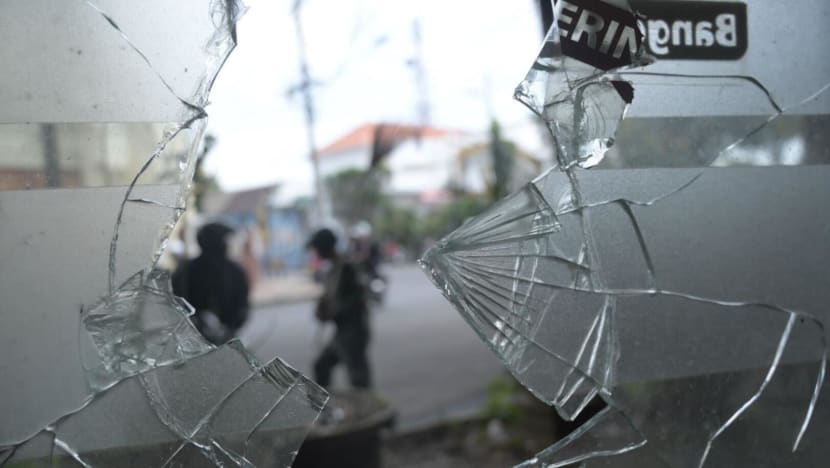World
Protests Erupt Across Indonesia Following Police Violence

Violent protests erupted across Indonesia on August 29, 2023, driven by widespread public frustration over the government’s insensitivity to the struggles faced by ordinary citizens. The unrest was sparked by police violence that resulted in the death of a motorcycle taxi driver, Affan Kurniawan, during a protest against lawmakers’ allowance increases. As anger boiled over, demonstrators targeted police stations and the national parliament, raising concerns about the stability of President Prabowo Subianto‘s administration.
On Thursday night, Affan was killed when a police armored vehicle struck him while he was delivering food. His death intensified protests that had already been fueled by the government’s decision to increase lawmakers’ housing allowances to 50 million rupiah (approximately USD 3,075)—a figure that starkly contrasts with Jakarta’s minimum wage. The protests quickly escalated into violence, with demonstrators causing significant damage to public property in Jakarta and other cities, including Makassar, Surabaya, and Yogyakarta.
Public Discontent and Government Response
In Jakarta, the aftermath of the protests revealed scenes of destruction. Burned-out vehicles and damaged police posts littered the streets. Graffiti denouncing police brutality adorned the walls of the Jakarta Police headquarters and the national parliament. Tensions flared as police used tear gas to disperse crowds attempting to gather outside the Mobile Brigade headquarters in Depok, West Java.
Political analysts attribute the unrest to a broader discontent with political elites whose policies seem disconnected from the realities faced by the public. Kunto Adi Wibowo, a political analyst at Padjadjaran University, noted, “Prabowo seems to be in his own bubble. He appears detached from the reality on the ground.” His calls for an investigation into the police’s actions were seen as too little, too late, failing to quell the rising tide of anger.
Demonstrations in other cities were similarly intense. In Makassar, three individuals lost their lives when protesters set the provincial parliament building ablaze. Reports of vandalism and clashes were widespread, with local police stations reporting severe damage.
Implications for the Prabowo Administration
As protests spread, analysts warned that the government’s failure to adequately address public grievances could lead to a political crisis. Agung Baskoro, a political analyst at the Trias Politika Institute, emphasized that the parliamentary majority backing Prabowo’s government has contributed to a sense of complacency among lawmakers. With 81 percent of the 580 seats in the House held by parties in Prabowo’s ruling coalition, the parliament has often been criticized for neglecting its role as a check on executive power.
House Speaker Puan Maharani issued an apology in response to the unrest, acknowledging shortcomings in representing the people’s interests. However, many believe that her remarks came too late to have any meaningful impact. “An apology alone is not enough,” Agung stated, calling for concrete policy changes, including a reconsideration of the controversial allowance hike.
The ongoing turmoil echoes Indonesia’s history of protests, with analysts recalling the Reformasi movement that led to significant political change in 1998. While some experts believe that the current unrest is unlikely to unseat Prabowo, they caution that unresolved issues could trigger further discontent.
As public calls for accountability grow louder, the Civil Society Coalition has demanded comprehensive police reform and the dismissal of National Police Chief Listyo Sigit Prabowo for failing to address systemic issues within the force. The situation remains fluid, with analysts urging the government to act swiftly to restore public trust and avoid further escalation.
Prabowo’s recent statements, including a commitment to support Affan’s family, were seen as steps toward addressing the public’s anger. Yet, experts argue that true reform is necessary to demonstrate a commitment to the welfare of Indonesian citizens. The coming days will be crucial as the administration navigates this challenging landscape, with the potential for fresh protests always looming.
-

 Business5 months ago
Business5 months agoKenvue Dismisses CEO Thibaut Mongon as Strategic Review Advances
-

 Lifestyle4 months ago
Lifestyle4 months agoHumanism Camp Engages 250 Youths in Summer Fest 2025
-

 Sports4 months ago
Sports4 months agoDe Minaur Triumphs at Washington Open After Thrilling Comeback
-

 Sports5 months ago
Sports5 months agoTupou and Daugunu Join First Nations Squad for Lions Clash
-

 Top Stories5 months ago
Top Stories5 months agoColombian Senator Miguel Uribe Shows Signs of Recovery After Attack
-

 World5 months ago
World5 months agoASEAN Gears Up for Historic Joint Meeting of Foreign and Economic Ministers
-

 Health4 months ago
Health4 months agoNew Study Challenges Assumptions About Aging and Inflammation
-

 Business5 months ago
Business5 months agoOil Prices Surge Following New EU Sanctions on Russia
-

 Entertainment4 months ago
Entertainment4 months agoDetaşe-Sabah Violin Ensemble Captivates at Gabala Music Festival
-

 Entertainment4 months ago
Entertainment4 months agoBaku Metro Extends Hours for Justin Timberlake Concert
-

 Top Stories5 months ago
Top Stories5 months agoRethinking Singapore’s F&B Regulations Amid Business Closures
-

 Business5 months ago
Business5 months agoU.S. House Approves Stablecoin Bill, Sends to Trump for Signature









